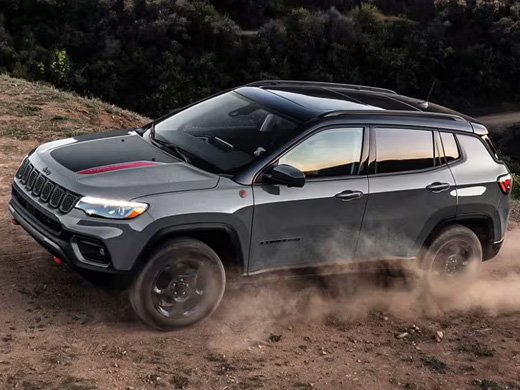What Kind Of Gas Does A Jeep Compass Take

The Jeep Compass, a popular compact SUV, offers a blend of off-road capability and everyday practicality. One of the frequently asked questions surrounding this vehicle centers on its fuel requirements: "What kind of gas does a Jeep Compass take?" The answer, while seemingly simple, warrants a deeper dive into technical specifications, engineering choices, and real-world performance considerations.
Recommended Fuel Grade: A Balancing Act
The manufacturer's recommendation for the Jeep Compass is typically 87 octane regular unleaded gasoline. This recommendation is primarily driven by engine design and intended use. The standard engines found in most Compass models, including the 2.0L and 2.4L naturally aspirated engines, are designed to operate optimally with this fuel grade. The engine's compression ratio and ignition timing are calibrated to maximize efficiency and power output using 87 octane fuel. Using a higher octane fuel in these engines will not provide any noticeable performance gains and is generally considered a waste of money.
However, certain Compass models or model years, particularly those equipped with turbocharged engines (like the 1.3L turbo), may have a different recommendation. It is crucial to consult the owner's manual specific to your vehicle to confirm the correct fuel grade. Some turbocharged engines might benefit from (or even require) premium fuel (91 octane or higher) to prevent knocking and ensure optimal performance. This is due to the increased cylinder pressures associated with forced induction.
Technical Specifications and Engineering Choices
The choice of fuel grade is intrinsically linked to the engine's design. A higher octane rating indicates greater resistance to auto-ignition or "knocking." Knocking occurs when the air-fuel mixture in the cylinder ignites prematurely, leading to irregular combustion and potential engine damage. Engines with higher compression ratios or forced induction are more prone to knocking and therefore often require premium fuel. The engineers at Jeep have carefully considered these factors when designing the Compass's engines, balancing performance, fuel efficiency, and cost considerations to arrive at the recommended fuel grade.
The engine control unit (ECU) also plays a crucial role. The ECU monitors engine parameters like knock sensor readings and adjusts ignition timing to prevent knocking. In some vehicles, the ECU can adapt to different fuel grades to a certain extent. However, this adaptation is usually limited, and consistently using a lower octane fuel than recommended can lead to reduced performance and potentially long-term engine damage.
Real-World Performance and Alternatives
While 87 octane is generally sufficient for most Jeep Compass owners, certain driving conditions might warrant considering higher octane fuel, even if it is not explicitly required by the manufacturer. For instance, if you frequently tow heavy loads, drive in extreme heat, or experience persistent knocking, using 89 or 91 octane fuel might provide some benefit. However, this should be viewed as a troubleshooting measure rather than a regular practice.
It is important to distinguish between premium fuel and ethanol-free fuel. While premium fuel refers to a higher octane rating, ethanol-free fuel simply lacks the ethanol additive. Ethanol is commonly added to gasoline to increase octane and reduce emissions. While ethanol-free fuel can offer certain advantages, such as improved fuel economy in some cases, it is generally not necessary for a Jeep Compass and may be more expensive. Check fuel compatibility with ethanol percentage specified in your owner's manual.
Reliability and Maintenance Tips
Using the recommended fuel grade is crucial for maintaining the reliability and longevity of your Jeep Compass's engine. Using a lower octane fuel than recommended can lead to knocking, reduced performance, and potentially engine damage over time. Conversely, using a higher octane fuel than necessary will not provide any benefit and is simply a waste of money.
Regular maintenance, including oil changes, air filter replacements, and spark plug replacements, is also essential for optimal engine performance. These maintenance items help ensure that the engine is running efficiently and that the combustion process is clean and complete.
Pros and Cons of Different Fuel Grades
Regular Unleaded (87 Octane):
Pros: Lower cost, readily available, suitable for most driving conditions.
Cons: May not be optimal for high-performance driving or towing, potential for knocking under extreme conditions.
Premium Unleaded (91+ Octane):
Pros: Higher resistance to knocking, potentially improved performance in turbocharged engines, may provide better fuel economy under certain conditions.
Cons: Higher cost, may not provide any benefit in engines designed for regular fuel.
Ethanol-Free Gasoline:
Pros: Potentially improved fuel economy, reduced corrosion of fuel system components.
Cons: Higher cost, less readily available, may not be compatible with all vehicles.
Future Trends
The automotive industry is rapidly evolving, with a growing emphasis on fuel efficiency and alternative fuels. Future Jeep Compass models may incorporate more advanced engine technologies, such as direct injection and variable valve timing, which could influence fuel requirements. The increasing adoption of hybrid and electric powertrains will also impact the fuel landscape, potentially reducing the reliance on gasoline altogether.
Furthermore, advancements in fuel technology, such as the development of higher octane biofuels, could offer a more sustainable and efficient alternative to traditional gasoline. These innovations are likely to shape the future of fuel requirements for vehicles like the Jeep Compass.
In conclusion, while the Jeep Compass generally operates efficiently on 87 octane regular unleaded gasoline, understanding the nuances of engine design, driving conditions, and fuel alternatives is crucial for optimizing performance, ensuring reliability, and making informed decisions at the pump. Staying informed about future trends in automotive technology and fuel development will be equally important as the industry continues to evolve.
